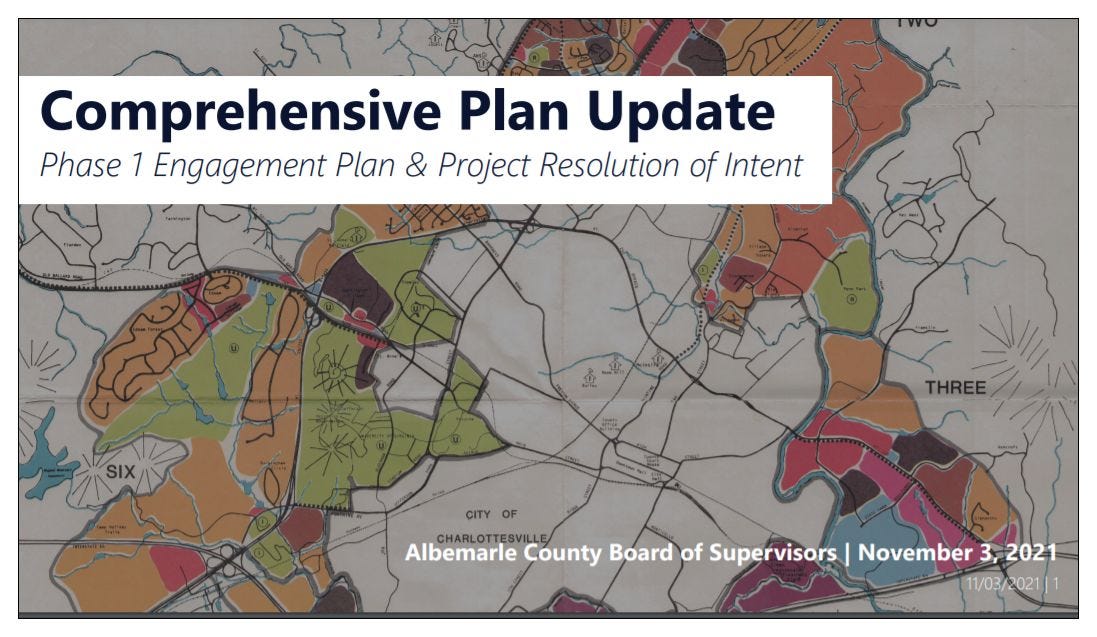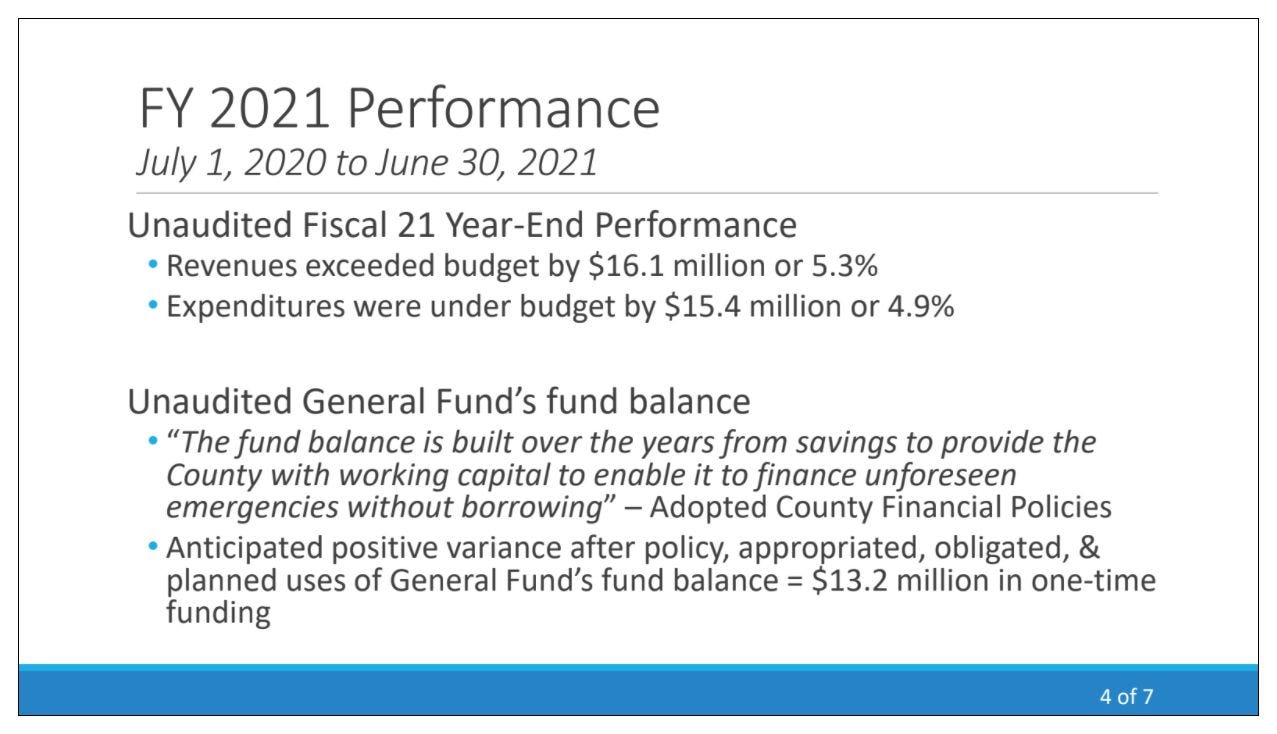Let’s begin with a Patreon-fueled shout-out.
Colder temperatures are creeping in, and now is the perfect time to think about keeping your family warm through the holidays. Make sure you are getting the most out of your home with help from your local energy nonprofit, LEAP. LEAP wants you and yours to keep comfortable all year round, and offers FREE home weatherization to income- and age-qualifying residents. If you’re age 60 or older, or have an annual household income of less than $74,950, you may qualify for a free energy assessment and home energy improvements such as insulation and air sealing. Sign up today to lower your energy bills, increase comfort, and reduce energy waste at home!
On today’s show:
One of Charlottesville’s former police chiefs wants to sue the city for wrongful termination
Albemarle Board of Supervisors formally begins Comprehensive Plan review
Albemarle may also have a potential budget surplus of over $13 million
ProPublica takes a look at the links between industrial air pollution and cancer
The Virginia Festival of the Book will return to an in-person event next March
Former Charlottesville Police Chief RaShall Brackney has filed a complaint with the United States Equal Employment Opportunity Commission alleging she was wrongfully terminated by former City Manager Chip Boyles. Boyles resigned on October 12 citing personal and professional abuse in the aftermath of the firing.
Brackney and her lawyer Charles Tucker held a press conference this morning to announce the complaint as well as a demand for millions in damages. Tucker appeared to make the claim that Brackney is still the chief.
“She’s not here today to talk about an abrupt termination,” Tucker said. “She’s here today to talk about a wrongful attempt at termination.”
Tucker alleged collusion to remove Brackney by Council, top police officials, and former manager Boyles.
Complaints to the EEOC are private and information is only available to be released the individual who files the complain as well as the subject of the complaint. A spokesman for the EEOC told me today he could neither confirm or deny the existence of the complaint. He noted that an EEOC complaint is the first step toward filing a lawsuit.
Learn more about this process on the EEOC’s website. The agency’s authority comes from Title VII of the Civil Rights Act of 1964. There’s also a FAQ worth reviewing.
Tucker is employed by the Cochran Firm, a national law firm founded by the late Johnnie Cochran. Cochran was part of the legal team that successfully defended former football player O.J. Simpson on double murder charges in October 1995.
Special thanks to Dori Zook of WINA for providing the audio. Take a look at coverage on NBC29 for more information.
One of Charlottesville’s most popular events will return to some in-person events next spring. The Virginia Festival of the Book was canceled in 2020 and was held virtually in 2021, but will return with a hybrid event from March 16 through March 20. The Festival has also been holding online programs year-round as part of its Shelf Life series. Headlining speakers for the 28th festival will not be announced until January. Review previous programs on the VABook website at vabook.org.
Industrial investigation
An investigation by ProPublica has identified the Radford area in the New River Valley as one of the places in Virginia where residents are more likely to contract cancer due to air pollution. That’s due to the presence of the U.S. Army Radford Ammunition Plant.
“This facility alone is estimated to increase the excess cancer risk for people living within five miles by an average of 1 in 4,100,” reads their summary of the Radford area.
ProPublica’s interactive map also shows pollution hotspots in Richmond and Petersburg. Their work is based on analysis of five-years of data from the U.S. Environmental Protection Agency. Learn more in a story on NBC29 that’s part of a collaboration between Gray Communications and ProPublica.

You’re reading Charlottesville Community Engagement and it’s time for two more Patreon-fueled shout-outs. The first comes a long-time supporter who wants you to know:
"Today is a great day to spread good cheer: reach out to an old friend, compliment a stranger, or pause for a moment of gratitude to savor a delight."
The second comes from a more recent supporter who wants you to go out and read a local news story written by a local journalist. Whether it be the Daily Progress, Charlottesville Tomorrow, C-Ville Weekly, NBC29, CBS19, WINA, or some other place I’ve not mentioned - the community depends on a network of people writing about the community. Go learn about this place today!
Albemarle Comprehensive Plan process
Two stories from Albemarle today.
First, Albemarle County has formally begun the process of updating its Comprehensive Plan. The Board of Supervisors adopted a resolution on November 3 that kicks off a multiphase process and public engagement plan for the first round. But let’s get a reminder on what this is from planner Tori Kanellopoulos.
“The Comprehensive Plan is a guiding document for the county and is a twenty year plan which includes housing, transportation, land use, economic development, natural and historic resources,” Kannellopoulos said.
The plan influences everything from the Capital Improvement program to decisions on land use such as rezoning. Supervisors last adopted a plan six years ago.
“Since the current Comprehensive Plan was adopted in 2015, there have been a variety of new policies and plans adopted by the Board including the Climate Action Plan, an updated housing policy, Project ENABLE and an updated Strategic Plan,” Kannellopoulos said. “Additionally the Office of Equity and Inclusion was created and the Board adopted the new organizational value of community.”

Since 2015, Kanellopoulos said 4,000 new dwelling units have been built and the population is expected to continue growing. With that comes increased demand for urban services to be delivered by the local government.
The first phase will take a look at the county’s growth management policy, which has been embedded in the Comprehensive Plan for decades. That will include a capacity analysis for the county’s ability to provide new housing, as well as the needs of economic development.
“Phase 2 will identify the main topics of the Comprehensive Plan, evaluate existing conditions for each, and provide updated frameworks using the lens of equity and climate action,” Kannellopoulos said. “Phase 3 will identify recommended action steps to implement the plan and metrics to track progress. And Phase 4 will finalize the document for adoption.”
At the same time, Supervisors have asked for some changes to the zoning ordinance to happen concurrently with the Comprehensive Plan review. The winter holidays are approaching so there will not be a public kickoff for this process until January. Between now and then, a working group of community members and other stakeholders will be assembled to oversee the process.
Supervisor Ann Mallek said the process to update the Crozet Master Plan at times was more difficult due to the lack of institutional memory and history about how that area has been a designated growth area.
“There was a real challenge to help people to get enough background to be able to understand what they were being asked,” Mallek said. “And I think getting that knowledge base will prevent a lot of frustration that happens when people are asked to respond to a survey about which they’re given no information. And they just get mad.”
Mallek also wants more public meetings in places that aren’t government buildings.
Supervisor Ned Gallaway said he wants to make sure that the public knows the review is underway.
“It can be frustrating I would imagine for everybody involved where community members maybe come late to the game,” Gallaway said. “We do our best effort to put things out there that this is going to be worked on and the ways to participate are there. And then if they are missed, we get ‘Well, where is this coming from?’ at the 11th hour. Whatever we need to do [public relations] wide to engage the community, we’ll have to do.”
The Albemarle Planning Commission will have a work session on the Comprehensive Plan review at its meeting on November 16.
This is a reminder that I created Town Crier Productions specifically to cover this kind of topic. I have never and will never take any payment from Albemarle County for this service, nor will I take any direct payment for any other level of government. This program is supported by contributions from listeners and readers, and the goal there is to keep this reporting independent and to be transparent when you do hear shout-outs and the like.
Closing out FY21
Our second story from the November 3, 2021 Albemarle Board of Supervisors meeting comes from a fiscal update that came from a briefing from County Executive Jeffrey Richardson on the closing of Fiscal Year 21, which ran from July 1, 2020 to this past June 30. Like all localities, Albemarle was affected by the pandemic.
“The last 20 months have been unlike any in my professional working career and I probably speak for staff when I say our challenges and the kinds of issues and problems we face are unlike any that we have faced in our career,” Richardson said.
The pandemic began officially in Virginia on March 12, 2020 with the declaration of a state of emergency. That happened just as Albemarle was finalizing the budget for fiscal year 2021. A decision was made to rewrite the budget to pause some spending while more was known about underlying economic conditions. Richardson said staff initially assumed the worst case scenario.
“We artificially lowered our budget base so we had to go in and we had to make drastic cuts for fiscal year 21,” Richardson said.
Richardson said the economic outlook did not turn out to be as severe and he detailed the reasons why in his presentation. There has also been federal funding in the form of the CARES Act of 2020 and the American Rescue Plan Act of 2021. Here’s one example from Albemarle budget chief Andy Bowman.
“The county was able to reimburse a significant portion of its public safety expenditures which created a one-time savings in the middle of fiscal year 2021 which the Board of Supervisors used to establish a local pandemic reserve,” Bowman said.
Now the time has come to begin preparing for the budget for FY23, which will be adopted by the Board next May. That comes as the fiscal year 2021 budget is audited which will reveal whether there are additional funds leftover that be reprogrammed to achieve the county’s strategic goals.
This is known as “one-time” funds. In FY21, revenues were up 5.3 percent over budget and county spending was down 4.9 percent.
“Unaudited, we expect there to be $13.2 million in one-time funding that can be available to be reprogrammed as the county is heading into the season again of financial planning,” Bowman said.
Richardson told the Board that the local economy is strong, and there are many ways this funding could be used to make further investments in economic development.
“You met recently with your [Economic Development Authority] and I think that we need to consider more and I think now is the time to do more to set ourselves up for the future to help business expansion and to be a catalyst in this community to continue to strengthen our economic foundation,” Richardson said.
Richardson also suggested the Board consider a mid-year salary increase for county personnel could also be an option. The Board will have a work session on “workforce stabilization” on December 1. Other suggestions from staff will continue to come to the Board in weeks to come.
The next immediate step is a meeting of the Audit Committee on November 19. (meeting info)
A major change this upcoming year is that real estate reassessments for calendar year 2022 will be sent out a month earlier than usual due to issues with the post office and potential for delays caused by mail.
















Share this post